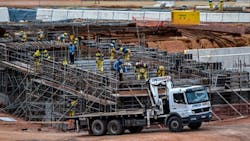China to Invest $50 Billion in Brazilian Heavy Industry, Infrastructure
Chinese Premier Li Keqiang began a three-day visit to Brazil on Tuesday where he was to unveil a $50 billion investment package during talks in Brasilia with President Dilma Rousseff.
Chinese investment is a huge boon for Brazil as the world's seventh-largest economy endures a fifth straight year of low growth after a period of rapid expansion fueled by Chinese demand for commodities.
Brazil hopes to use Beijing's cash to overhaul decaying infrastructure as Rio de Janeiro prepares to host South America's first ever Olympics next year.
His tour comes days after Beijing signed accords worth $25 billion with Russia and $22 billion with India.
Exponential growth
In Brazil Beijing sees even greater scope to bolster bilateral trade which has grown exponentially over the past decade, with the Asian giant becoming Brazil's main trading partner in 2009.
Trade between China and Latin America as a whole exploded from barely $10 billion in 2000 to $255.5 billion in 2012.
Sino-Brazilian trade mushroomed from $6.5 billion in 2003 to $83.3 billion in 2012, though China is just the 12th largest investor in Brazil.
Ahead of Li's arrival Monday evening, Jose Graca Lima, head of Asian affairs in the Brazilian foreign ministry, explained that a "second generation" of Chinese investment is under way.
The first involved trade in raw materials but the focus now is on heavy industry and infrastructure.
As well as industry, transport is a key area where China has identified major deals to be done.
China was to sign up Tuesday to take delivery of the first 22 commercial jets made by Brazilian manufacturer Embraer, the first segment of a deal covering a further 38 aircraft.
Railroad dream
But with China keen to facilitate the movement of imports from Brazil, an ambitious $10 billion project to build a transcontinental railway line stretching some 3,500 kilometers (2,200 miles) from Brazil's key southeastern port of Santos to Peru's Pacific port of Ilo is also being mooted.
The planned line, stretching either across Brazil and into Peru or potentially via a shorter route into Peru via Bolivia, would go through Amazonia, sparking environmental concerns.
"If we consider Brazil's investment portfolio, then clearly a project of this dimension is justified," Trade Minister Armando Monteiro told AFP in an interview Monday.
"Brazil hopes in this new phase in relations with China to obtain a significant increase in investment," Monteiro added, saying Brazil could become a platform to produce Chinese industrial goods locally to supply the domestic market but also for export.
Brazil has seen its reputation hit by a huge graft scandal at oil giant Petrobras. But the firm received a boost earlier this year when it signed a $3.5 billion financing deal with the China Investment Bank.
With the Olympics fast approaching and dilapidated infrastructure hampering economic activity, Brazil is keen for the focus to shift from trade to investment.
Despite being Brasilia's number one trading partner, China stands only 12th on the list of foreign investors in the South American giant -- behind both Venezuela and Argentina, according to the U.S.-based Inter-American Dialogue Center.
Copyright Agence France-Presse, 2015
About the Author
Agence France-Presse
Copyright Agence France-Presse, 2002-2025. AFP text, photos, graphics and logos shall not be reproduced, published, broadcast, rewritten for broadcast or publication or redistributed directly or indirectly in any medium. AFP shall not be held liable for any delays, inaccuracies, errors or omissions in any AFP content, or for any actions taken in consequence.
